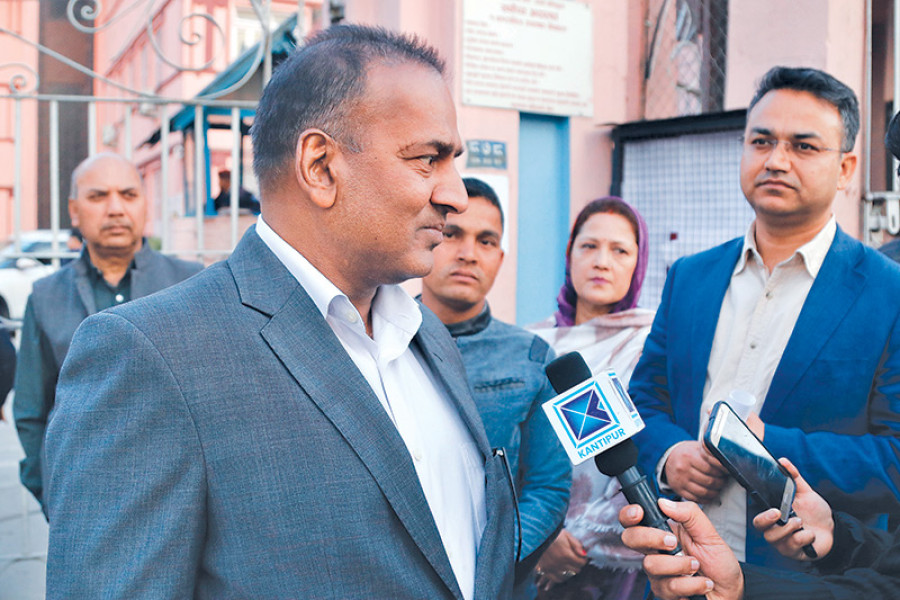Valley
Contempt case against Kantipur sent to full bench
A contempt of court case against the Kantipur daily has been referred to a five-member full bench of the Supreme Court (SC).
A contempt of court case against the Kantipur daily has been referred to a five-member full bench of the Supreme Court (SC).
After recording statements from Kantipur members on Tuesday, a division bench of Justices Bam Kumar Shrestha and Damber Bahadur Shahi decided to send the case to a full bench citing the gravity of the matter.
The bench argued that it would be appropriate to forward the case to the full bench given the seriousness of questions raised during the hearing and the depth of the case.
The date for hearing the case by the full bench has been set for Sunday, March 11. Chief Justice Gopal Prasad Parajuli will form the bench.
The order came after the apex court recorded statements from four defendants—Kantipur Media Group Chairman and Managing Director Kailash Sirohiya, Director Swastika Sirohiya, Kantipur Editor-in-Chief Sudheer Sharma and correspondent Krishna Gyawali. On Tuesday, the division bench heard from CMD Sirohiya, Sharma and Gyawali. The court recorded Director Sirohiya’s statement on Sunday.
The Kantipur team that reached the apex court on Monday for statement returned following cancellation of all court proceedings due to the demise of ex-SC Justice Ramnagina Singh.
It took nearly four hours to record Sharma’s statement on Tuesday. He faced 32 questions in total, including one asking if he would apologise for publishing the news related to CJ Parajuli. Sharma rejected the call stating that he and his team firmly believed the news reports in question are accurate and not subject of contempt of court. Legal eagles say the question related to apology is objectionable.
After answering the questions, Sharma presented a 13-page document as part of his statement. He argues that the paper has not committed contempt of court but “prejudiced court proceedings adopted by CJ Parajuli abusing his position are the subject of contempt of court.”
“We fully believe that our trust, respect and conviction for the judiciary shall remain tall and high in future as well,” the document reads.
“In this period, we are informing people through impartial, free and objective news within the framework of independent judiciary, rule of law, press freedom and human rights,” reads the written statement.
“A capable and independent judiciary free of controversies is the prerequisite for a vibrant press.”
The Kantipur Publications denied publishing any news that has defamed the judiciary. “In the past two-and-a-half decades, media houses and staff have not faced any contempt of court charges. We don’t intend to hamper dignity of court and are promoting people’s respect and trust in the judiciary,” the document stated.
The document states that contents of the order issued in the name of Press Council Nepal are directly linked with Parajuli himself, aimed at resolving controversies surrounding him. “We have concluded that CJ Parajuli caused contempt of court by abusing his authority. Our news reports were supported by fact and aimed to inform the public, which cannot be a subject of contempt of court,” the document argues.
Arguing that the date of birth and discharging of judicial duties are separate things, Kantipur claimed that news reports do not affect the judicial process.
The statement said the Judicial Council had pointed out the controversy surrounding Parajuli’s date of birth while the court has already issued an order to probe his certificates.
In an interim order on February 25, CJ Parajuli directed the Press Council to probe news reports published by Kantipur reporting inconsistencies in his birth date as shown by his official documents.
National and international journalists’ bodies have condemned the CJ’s move calling it a clear case of prior censorship.
Barring of media gets ire
The Supreme Court’s decision to bar media from reporting the statement recording process in a contempt of court case against Kantipur Daily is against the principle of press freedom, media experts have said.
During the hearing process, journalists were barred citing “order from above”. “In other cases, journalists are allowed to witness the hearing. However, in the case related to the Kantipur daily, there was no access to journalists, which aims to limit press freedom,” said Shiva Gaunle, former chairman of the Federation of Nepali Journalists who specialises on court reporting.
“There are certain procedures of the court which must be respected by media. However, there should be not any obstacles to journalists. People’s access to judiciary is guaranteed through press which must be protected,” he added. “If there is no access to press, people will not know what is happening in court,” he said. Secretary at the Federation of Nepali Journalists Ram Prasad Dahal said there should be no obstruction for journalists while reporting. “The FNJ is of the view that all organisations must give journalists access,” said Dahal. (PR)




 16.12°C Kathmandu
16.12°C Kathmandu












